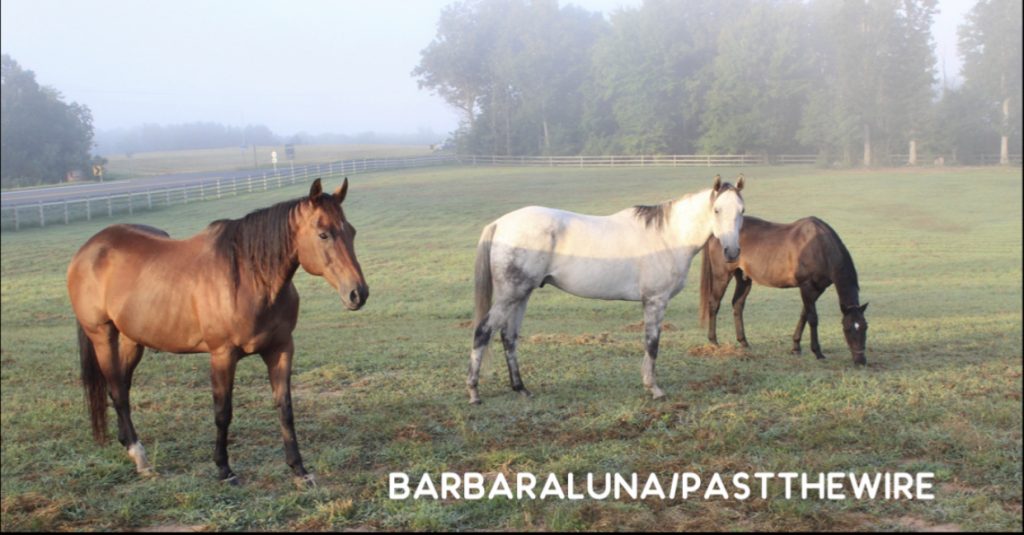
When was the last time anyone heard the term “racetrack reject” when talking of former Thoroughbred race horses? The term was not usually spoken in denigration of the many horses who were retiring from racing and usually given or sold to people who wanted a pleasure or show horse, but it certainly sounded like they had failed at something and that the breed was second rate because of its dismissal from racing due to injury, lack of ability or age.
It’s difficult to pinpoint the exact year that things began to change, when these retired runners started being called OTTBs, or off-track-Thoroughbreds, a kinder, more respectful title for the many intelligent, sensitive and athletic animals who have finished one career, but are very capable of succeeding in new ones after their days at the track are over. Their aftercare from the track became an important part of animal welfare.
Sponsored by Thoroughbred Charities of America (TCA) at the Kentucky Horse Park, the Retired Racehorse Project Makeover has become the event to showcase retrained Thoroughbreds in Western pleasure, barrel racing, dressage, eventing, hunters, jumpers, polo and other disciplines. This year, close to 450 horses from 40 states will demonstrate their new skills from October 2 – 5.
This year the Makeover will offer the Inaugural Thoroughbred Aftercare Summit, sponsored by the TCA, TERF (Thoroughbred Education and Research Foundation), RRP and TAA. The two-hour symposium will begin at 3 pm October 1 and is free to attend, though space is limited. Members of Thoroughbred Aftercare Alliance (TAA) will present the importance of business management, board governance, and grant and sponsorship-seeking best practices.
The Summit is led by TAA President Michael Mueser, who is an equine law expert and a managing director at Miller, Griffin and Marks PSC in Lexington. Mueser, who has been practicing equine law for 30 years, will be joined by TAA Treasurer Jen Shah who leads Dean Dorton’s equine tax and account services, and and Allison Carter, also of Dean Dorton, who specializes in non-profit tax.
“Allison Carter is a non-profit guru,” said Mueser. “She will lead this symposium, and Jen and I will chime in when needed.
Mueser remembers years ago selling horses for unpaid board bills for his clients. “I had the authority, back in those days, to sell them on the courthouse steps for over $50. When I later asked what happened to that horse, I was told he was resold to “Big Al,” our name for the local kill buyer. These horses were going to slaughter.”
Thankfully times have changed. Racetracks have laws and repercussions like loss of racetrack stabling or acceptance of horses in the entries that prevent owners or trainers from selling their horses to auctions. There is better overseeing of the fate of OTTBs, due to the financial support to non-profits by foundations like Thoroughbred Charities of America, and accreditation and grants by the TAA. The strict rules of accreditation by the TAA, the only organization in the country to offer such accreditation, insure that the horses end up safe after leaving the track.
“I have been involved with the TAA since it began,” said Mueser, who was elected President in January 2019 after serving as Vice-President. “I jumped at the chance, as I am a stickler about governance of non-profits. I believe in full compliance, and transparency. I created by-laws, conflict of interest policies, and the standards that have became our centerpiece. We presented aftercare in North America the right way.”
Since 2012, the Thoroughbred Aftercare Alliance (TAA), located in Lexington just a few miles from the Kentucky Horse Park, has granted over $13.8 million to accredited non-profit organizations. The 70 accredited programs must pass a rigorous inspection of the farms where they are cared for, financial records, as well as the feeding, retraining and adoption practices including the follow up of each horse placed in a new home.
Stressing the importance for the protection of OTTBs, Mueser acknowledged that many non-profits are doing everything right in horse care, but still need to run their programs by the rules. “When you sign up to be accredited by the TAA, which awards grant money after accreditation, we ask that you send us your by-laws, the date of your last election, who the board members are.
“Some non-profits do not follow through. There are challenges to these organizations in geography, climate, clients, employees, and they can become shorthanded with help, or have a shortage of active board members,” said Mueser. “But if they are struggling that much, maybe they should not do this.”
“Public perception is important,” said Mueser. “Thoroughbred racing is getting nothing but negative press. I argue to those that say that we are not concerned about aftercare. Our hard work is paying off and we have come a long way in short time. It is time for another push forward in aftercare to make sure there is a safety net for these horses as soon as they leave the track. Their care should continue until they die.”
The Aftercare Summit will kick off five days of competition, educational programs, vendors, demonstrations, and Makeover horse purchase opportunities to approved buyers. at the Kentucky Horse Park.
Barbara Luna




